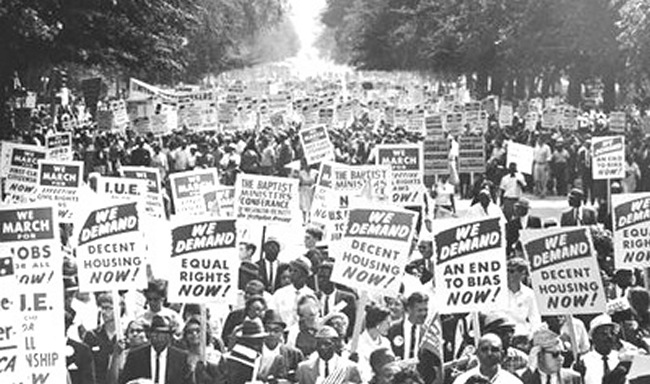
|
August
24,
2013
-
No.
33 The Fight for the
Affirmation of
the
|
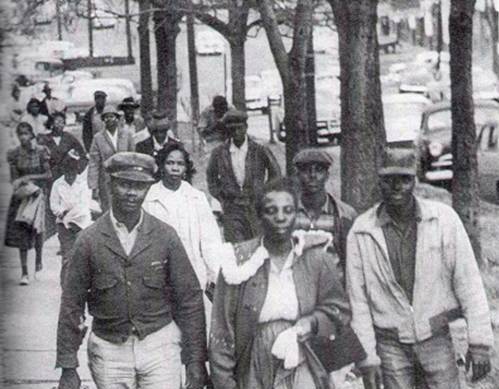 For more than a year, some 50,000 African Americans in Montgomery, Alabama participated in a boycott of segregated buses from 1955-1956, using any means but the bus to get where they needed to go. |
The 1963 March on Washington reflected the growing demand of the movement for equality and against the Viet Nam War to hold the federal government accountable. Comprised mainly of African American youth and students, as well as many workers, especially auto and steelworkers, the march brought more than 250,000 people to DC on August 28. More than 2,000 buses, 21 chartered trains, 10 chartered airliners, and thousands of cars converged on DC. Regularly scheduled planes, trains, and buses from southern and northern states were also filled to capacity. The New York City bus terminal was busy throughout the night and Maryland police reported that "by 8:00 am, 100 buses an hour were streaming through the Baltimore Harbor Tunnel," on their way to DC. Many thousands came from across the south, mobilized mainly by youth and students. The size and spirit of the action reflected the impatience of participants with calls to be "patient," and to put their faith in more laws to be passed. As the many signs and chants indicated, people were fighting for rights now!
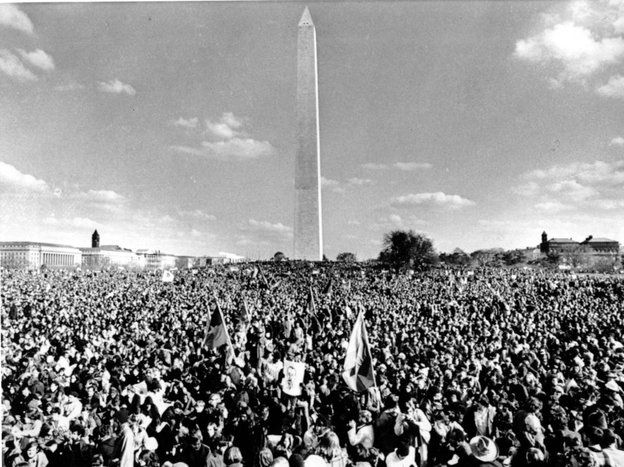 Demonstration at the Washington monument in 1969 against the Viet Nam War. |
Kennedy had urged the various official leaders, such as A. Philip Randolph, (head of the Brotherhood of Sleeping Car Porters, President of the Negro American Labor Council, and Vice President of the AFL-CIO); Martin Luther King, Jr. (President of the Southern Christian Leadership Conference), Roy Wilkins (President of the National Association for the Advancement of Colored People), and Whitney Young (President of the National Urban League) to call off the march. But the demands of the movement for action targeting the federal government was not under their control. The monopoly media tried to create fear of "riots" and violence before the march occurred, while the Pentagon had 19,000 troops waiting. The youth and student organizers, from south and north, included many from the anti-war movement. They refused to be intimidated or provoked and instead went all out to mobilize and ensure an organized, united action.
The march had historic significance in uniting forces from south and north in the fight for equal rights. Generally, the struggle up to that point had largely been in the south, concentrated in Alabama, Georgia and Mississippi. Numerous battles had been waged in the 1950s and early '60s against lynching, KKK terror, police brutality, for voting rights and an end to discrimination in schools, jobs and housing. These included the Montgomery, Alabama bus boycott in 1955, the fight for the equal right to education and opposing segregation of high schools and universities, the Freedom Rides where northern students, black and white joined in the battle against segregation and for rights. Many had experience with the racism and brutality, not only of local and state police, but with the federal government and its FBI, which organized and fomented KKK terror.
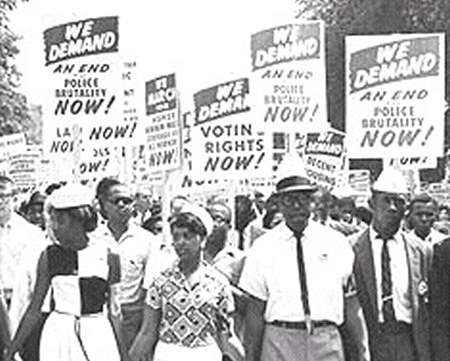 The
1963 March reflected
this experience and broadened
the demand to
hold the federal government accountable for
inequality and racist state
attacks
by having it taken up in north and south.
Participants did not accept
demands by those at
the top
like Kennedy that people should rely on the courts
and
federal
government to solve the problems.
Instead, the
march contributed to galvanizing continued
actions, in DC and
elsewhere,
north and south, demanding the affirmation of
their rights.
The
1963 March reflected
this experience and broadened
the demand to
hold the federal government accountable for
inequality and racist state
attacks
by having it taken up in north and south.
Participants did not accept
demands by those at
the top
like Kennedy that people should rely on the courts
and
federal
government to solve the problems.
Instead, the
march contributed to galvanizing continued
actions, in DC and
elsewhere,
north and south, demanding the affirmation of
their rights.
The 1963 March is promoted today as the "I Have a Dream" civil rights march, named after the speech given there by Martin Luther King Jr. This reflects the desire of the powers-that-be to portray the movement for rights at that time as limited to getting passage of the Civil Rights and Voting Rights Acts, later passed in 1964 and 1965 respectively. No doubt the legislation was passed in great part in response to the fierce battles waged. But more importantly, the organizing for the march and the action itself served to further politicize and unite the movement and strengthen its conviction on the need to rely on the people's own efforts and to hold the federal government responsible for the widespread inequality. This was evident in the continued organizing efforts throughout the '60s and '70s to further advance the struggle for rights and in the fact that, today, the movement for the affirmation of rights continues to gather strength despite all attempts to disinform and manipulate it into supporting this or that section of the ruling class as it seeks to hold onto power or seize power to perpetuate a system which can only exist based on various forms of ever more brutal oppression, exploitation and inequality.
On this occasion, TML Weekly expresses its highest regard for the American working class, whose fight to uphold the rights of all has stopped the American ruling class from causing even more damage at home and abroad. TML Weekly also specifically salutes the African American and Hispanic contingents of the American working class who have always stood in the front ranks of every struggle. As a result, the American people have created a proud history for themselves. Those who stand as one with the struggles of the peoples of the world have guaranteed that U.S. imperialism is brought under control at home and abroad time and time again. There is no greater need than to do the same today.
Anti-Communist "Black Ribbon Day"
Block the Glorification of Nazism!
Defend the Rights of All!
The Harper government put yet another black mark on the reputation of Canada on August 23 by declaring that it has donated "up to $1.5 million over two years" to a scurrilous organization called Tribute to Liberty (TTL). The money is for "a national memorial to the tens of millions of innocent victims of Communist regimes around the world," a government press release declared. In fact, the reason the Harper government has given the money is because the scurrilous organization cannot raise the money for said monument itself as nobody supports it or its nefarious aim.
 Anti-fascist partisans of the Polish People's Army, circa 1944. Partisan forces in all the areas occupied by the Nazis worked closely with the Soviet Red Army to defeat the Nazis. |
The Harper government has already manoeuvred to have its appointees to the National Capital Commission (NCC) donate prime land on Wellington Street in Ottawa as the site of the monument. The members of the NCC have absolutely no expertise between them to judge whether the Tribute to Liberty project is worthy of any recognition whatsoever. Their donation of a site in the "Garden of the Provinces and Territories" across from the Supreme Court and National Archives is irresponsible as well as reprehensible. In fact, the monument is an insult to the contribution made by Canadians from coast to coast to coast, from all walks of life and from countries in every corner of the earth, to the fight to defeat Nazi-fascism and Japanese militarism before and during World War II and thereafter. With the announcement that the Government of Canada is officially funding this monument, the government has now officially adopted the Hitlerite propaganda which blames the Soviet Union for starting the Second World War and causing the deaths of millions of Soviet citizens and citizens of the European countries.
This is what Prime Minister Stephen Harper said in his official statement on so-called Black Ribbon Day, August 23, designated by the Canadian Parliament as the "National Remembrance Day for the Victims of Communism and Nazism in Europe" in December 2009. His statement said in part:
"Black Ribbon Day marks the shameful anniversary of the Molotov-Ribbentrop Pact between the Communist Soviet Union and Nazi Germany, which directly led to the occupation of numerous European countries and to the slaughter and oppression of their citizens. This day serves as a reminder of the importance of protecting democracy and freedom, and of educating current and future generations about the crimes against humanity that occurred during the darkest chapter of human history."
Not a word about the Nazis' slaughter of millions. Not a word about the Nazi occupation of one country after the other and its blitzkrieg of the British Isles. Not a word about the death camps and the slave labour camps. Not a word about the glorious deeds of the peoples of the Soviet Union and all of Europe and the world including the Canadian people to defeat the Nazi onslaught. The Second World War was the fault of the Soviet Union! It is unconscionable!
 Jewish Partisans of the Chkalov Brigade, pictured here in Belorussia in 1943. |
In this way, what the Communist Party of Canada (Marxist- Leninist) pointed out when this memorial project was first announced some years ago has become increasingly evident. It is not a memorial to victims of "totalitarian regimes" but an anti-communist glorification of Nazism. This is why the proposed monument takes up the rallying cry of the Hitlerites and their appeasers to defeat communism no matter what the cost.
This is also why the seriously misnamed Minister of Multiculturalism Jason Kenney, when he announced the federal funding, declared:
"It was on this day in 1939 that Nazi Germany and the Communist Soviet Union signed the Molotov-Ribbentrop Pact -- the notorious non-aggression treaty that ultimately led to the Second World War.
"The pact paved the way for Nazi and Soviet
cooperation
in the violent
occupation of the lands of many Central and
Eastern European countries.
The
suffering inflicted on the people of these
countries by both regimes
was so
horrific, that this part of Europe has since been
referred to by many
as the
'Bloodlands.' [...]
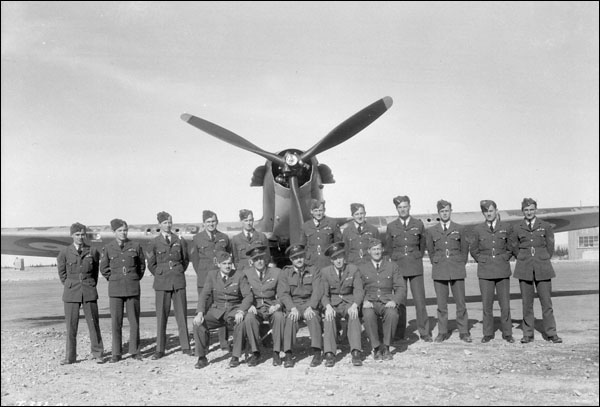 1942 photo
of RCAF
pilots from Torbay Air Force base in
Newfoundland, some of the over one
million Canadians who enlisted to
fight fascism during the
second world war.
|
"That is why today the Government of Canada announced that we will partner with the Tribute to Liberty organization to construct a Memorial to Victims of Communism in our nation's capital. This memorial will stand to remind future generations that this historical evil must never again be allowed to flourish."
"Once completed, this memorial will teach future generations how millions lost their lives and suffered in inhumane conditions at the hands of Communist regimes.
"It will also serve as a reminder to all Canadians that glorifying Communist symbols insults the memory of these victims, and that we must never take for granted our core values of freedom, democracy, human rights and the rule of law."
The Minister of Citizenship and Immigration, Chris Alexander, joined in by letting it be known that his government represents only some citizens and immigrants, not others:
"Canada is today home to many different communities affected by Communism in their countries of origin, and our government is pleased to help make a Canadian memorial to victims of Communism one step closer to reality."
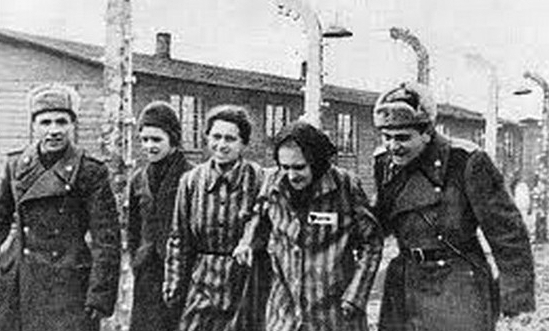 Auschwitz prisoners liberated by the Soviet Red Army. |
TML Weekly is of the opinion that Canadians will not tolerate such a blemish on the contributions of anti-fascist Canadians to the cause of freedom, democracy, peace and justice in the great anti-fascist war. They will not permit the 25 million Soviet lives lost to defend their freedom and that of the peoples of the world to be wiped off the historical record by the likes of these Hitlerite propagandists. They will not tolerate the office of the Minister of Multiculturalism and all the power of the Government of Canada and state and monopoly media to falsify history in the most wretched manner imaginable. And what victims is the Minister defending when he claims that glorifying communist symbols insults their memory? Could it be the Nazis and their collaborators who were defeated during World War II? This is who Tribute to Liberty and its supporters are championing.
As concerns what the Harper government is up to, it is clear they are hurrying to put in place all the trappings of making communist political opinion and organizing a crime in Canada before they are turfed out of office. If that is not following in Hitler's footsteps, we do not know what is. The Canadian working people cannot let it pass. It is also to divert the attention of Canadians from what this government is really up to in pushing the anti-social offensive and taking Canada to war. This fight of the working class and people of this country must be stepped up to defeat this retrogression once and for all.
May the memory of the communists who fought like lions to save the world from Nazi-fascism live forever! May the younger generation take up their legacy and block the glorification of Nazism today, so as to avert the disasters which the Hitlerites of today are planning! May all Canadians who directly fought or have family members who fought in the great anti-fascist war take action to block the infamies being carried out in the name of opposing communism and supporting democracy. It must not pass!
Harper Dictatorship's
Anti-Communist Crusade Degenerates Further
The designation of August 23 as "Black Ribbon Day" starkly illustrates the kind of "shared values" that the Harper dictatorship's domestic and foreign policy serves. This is the day the European Parliament designated in April 2009 as the "Europe-wide Remembrance Day for the victims of totalitarian regimes" (also known as "Black Ribbon Day") and the Canadian Parliament designated as the "National Day of Remembrance for the Victims of Communism and Nazism in Europe" in December of the same year. By this they do not mean the victims of nazi-fascism but of the crimes they ascribe to the communists, mainly at the time of the anti-fascist war.
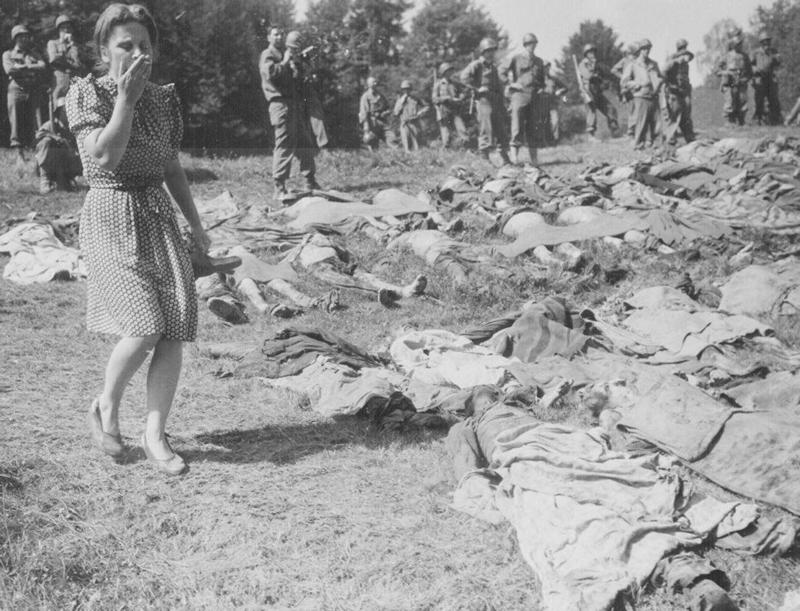 One of countless Nazi atrocities -- the bodies of 800 slave workers murdered by SS guards near Namering, Germany, are laid out in public as a warning to townspeople. |
Past speeches by Harper and others on August 23 demonstrate how the ruling circles of Canada and other countries define human rights and humanitarianism on a cold war anti-communist basis to cover up their crisis of governance today and their inability to resolve any problem facing their societies at this time. They are spending millions of dollars to launch campaigns to instill anti-communism in the minds of the people in order to sabotage the worker's movement, the movement in defence of immigrants and refugees, the movement in defence of the hereditary rights of First Nations and the anti-war movement, and lead them into an abyss. They deliberately use the word "totalitarianism" to falsely equate Nazism with communism, while waging their own wars of aggression against sovereign countries in the name of a market economy, human rights and a multi-party democracy. This is what the U.S., European powers and Canada have done since the 1990s against Yugoslavia, Iraq, Afghanistan and Libya, and have now also started doing against Syria as well as Iran.
 Mass grave at Nazis' Bergen-Belsen concentration camp. These are the crimes Canada condemns. They were perpetrated by the Nazis, Mr. Harper, not the communists. |
The real historical significance of August 23, which is being deliberately covered up, is that it is the anniversary of the 1939 Soviet-German Non-Aggression Pact (Molotov-Ribbentrop Pact) that gave the Soviet Union an extra 22 months to build up its defences against the expected Nazi invasion. By September 1938, Germany had occupied Austria and taken over Czechoslovakia. The Soviet Union called on Britain and France to sign a collective mutual assistance pact, which might have saved Europe from the Second World War or, at least, ensured that the war was shorter and less destructive. The British and French imperialists rejected the proposals for collective security because they hoped they could egg on Hitler to attack the Soviet Union. Of course Britain and France had already signed the sellout Munich Agreement with the Nazis in September 1938, which gave Hitler the green light to start invading Europe. The Soviet Union thwarted the Anglo-French plan by signing the Soviet-German Non-Aggression Pact, which simply stated that Germany would not attack the Soviet Union and the Soviet Union would not attack Germany, even though the Soviet Union had no illusions about Hitler's plans. When Nazi Germany attacked the Soviet Union on June 22, 1941, the pact was immediately voided, and, as history shows, the preparations permitted the Soviet Union to play a major role, at tremendous sacrifice, in ending the twisted Nazi dreams of world conquest.
Jason Kenney, the arch-reactionary federal Minister for Multiculturalism, clearly used his "Black Ribbon" speech on August 21, 2012 to try to falsely equate communism with Nazism. He constantly referred to Nazism as "national socialism" vainly hoping to fool some people into thinking that Nazism, the violent dictatorship of the biggest German monopolies and their U.S. collaborators, had something to do with socialism. Here he takes a lesson from Hitler himself, who also tried to mislead the German people by pretending that Nazism had some kind of socialist content.
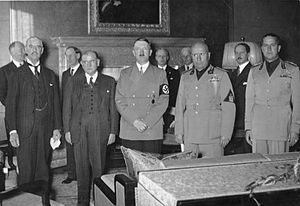 Left to right: Chamberlain, Daladier, Hitler, Mussolini, and Ciano at signing of sellout Munich Agreement in 1938. |
At the end of his 2012 speech, Kenney exposed his own deviousness in pretending to oppose Nazism by promoting the floundering project to build a monument in Canada to the "victims of communism." He directly quoted his leader Harper, stating that the so-called Memorial to Victims of Communism "shall stand as a reminder that all political systems are not the same, that our democracy and our freedoms are to be cherished, exercised and protected." This year Kenney went further announcing that the Government of Canada will partner with the Tribute to Liberty organization in constructing the memorial saying "Once completed, this memorial will teach future generations how millions lost their lives and suffered in inhumane conditions at the hands of Communist regimes." He stated that the federal government would be providing up to $1.5 million for the private monument project, without a single consultation with anyone, especially the Canadian people.
Like all reactionaries, Harper and Kenney always
wave
the flag of
democracy
and freedom when they want to conceal their
sinister agenda. Kenney
manages to do this without mentioning Nazism at
all, thereby
showing
that the real essence of both Black Ribbon Day and
the monument project
is
anti-communism.
The Anti-Communist Monument
The so-called "monument to the victims of communism" that Harper and Kenney are funding is a shady state-supported project that is being organized by a group calling itself "Tribute to Liberty" (TTL). The group hopes to build what is officially called "A Memorial to Victims of Totalitarian Communism -- Canada, a Land of Refuge." The monument project in Canada is based on and linked to the very similar U.S. Victims of Communism Memorial, dedicated in 2007, whose honourary chairman is war criminal George W. Bush and whose benefactors include monopolies such as defence contractor Lockheed Martin and the dominionist Amway Corporation. In Canada, the TTL project was given the go-ahead in 2009 behind closed doors by the federal government's National Capital Commission (NCC), which oversees the use and development of national capital region land. Kenney wants the monument to be built in Ottawa and the NCC has approved the Garden of the Provinces and Territories in Ottawa, a prime location across from the Supreme Court of Canada.
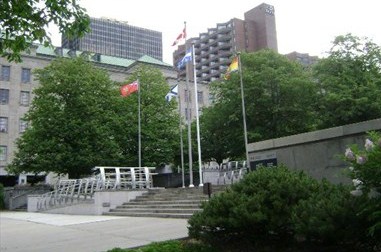 Garden of the Territories and Provinces approved by NCC as site for proposed anti-communist monument. |
TTL's private anti-communist project has been made a public project by Harper and a number of his Cabinet Ministers and MPs, including Kenney, Peter Kent and Peter van Loan, as well as Liberal MP Irwin Cotler, BC Conservative Senator Yonah Martin, and former Liberal Leader Bob Rae, all of whom have signed the list of project supporters and actively promote the monument. On March 5, 2013, Kenney did a photo op with the new TTL Chairperson, Ludwik Klimkowski, at the site of the Berlin Wall in Germany. But despite all the official support and promotion, so far the project is a failure. In fact, former TTL Chair Alide Forstmanis stated in October 2012 that Klimkowski, an investment planner, was being brought in specifically to remedy the unsuccessful fund-raising.
On December 7, 2012, Klimkowski organized the first TTL fund-raising dinner at the home of Ontario Conservative Senator Linda Frum,[1] a veteran Conservative Party fundraiser, suggesting that TTL's latest strategy is to directly seek donations from the corporate sector as well as to continue to foster government connections. The more direct ties to the corporate sector are also reflected in the three new TTL board members elected along with Klimkowski, one of whom is a lawyer with Stikeman Elliott, one of the seven leading Toronto corporate law firms. Hosts and guests at the December 2012 dinner included Senator Frum's husband Howard Sokolowski, founder of Ontario real estate corporation Metropia; James Temerty, President of Northland Power; and Fred Waks, President and COO of shopping centre giant RioCan and a major fundraiser for Israel. However, while attempts to directly raise funds from pro-Nazis may succeed, it will be difficult to successfully involve the Jewish community, whose avowed hatred for the Hitlerites and their crimes against humanity cannot be reconciled with the glorification of Nazism by the promoters of Harper's monument.
The current financial status of the monument
project is
unclear but a July
2012 news report stated that documents filed with
the Canada Revenue
Agency
show that TTL was far from achieving its
fund-raising goal for the
project of
$1.5 million, having raised a paltry $140,000,
spending most of
that on
operational and administrative costs. By the end
of 2011, TTL had only
$9,600
in the bank. The NCC was supposed to hold a design
competition for the
monument in the spring of 2012, but first required
a deposit of
two-thirds of
the money for the construction costs, about
$650,000. The latest TTL
newsletter dated June 4, 2013, in its
advertisement for a project
manager,
claims that the project needs $4 million of which
only 40 per cent has
been
raised. Now to save the nefarious project the
required $1.5 million is
to be provided by the Government of Canada.
Prior to this in a recent attempt to solve their
financial problems,
TTL applied in 2012
to the Harper government for a grant of $750,000.
Kenney's office said
at that time that the
government was working with TTL and would consider
the funding
application
at a later date. Kenney's press secretary Alexis
Pavlich noted that the
government committed to the memorial in its 2010
Speech from the Throne
and again in the Conservative Party's 2011
election campaign platform.
The
Harper government's provision of these monument
funds is another sign
of its profound corruption in view of the fact
that the federal
Conservatives have
been
defunding any charities in Canada which have a
"political agenda" in
order to
try to silence them. Clearly, what is really meant
by "political
agenda" is any
agenda that is opposed by the Harper dictatorship.
Any charity like TTL
that
supports anti-communism and fascism can no doubt
move to the head of
the
trough for substantial Harper handouts. And this
is exactly what has
happened!
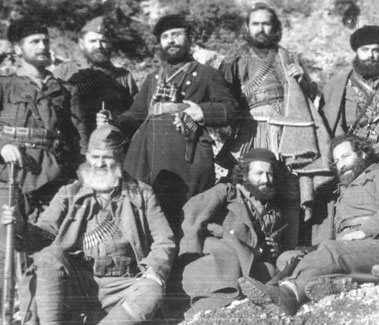 Greek anti-fascist fighters. |
A TTL spokesperson suggested the monument project
lacks
funds because,
"It's a difficult project for a lot of the public
to understand." An
alternative
explanation is that the working class and people
of Canada understand
the
project very well and strongly oppose its virulent
anti-communist,
pro-fascist
content. Many people, for example, still remember
the major role played
by
the Soviet Union in defeating the Hitlerite Nazis.
Many workers are
aware of
the key role played by the communists in helping
build Canada's trade
unions.
Instead of a phony monument against so-called
totalitarianism, the
people of
Canada would likely support a monument
commemorating the real victims,
that is, the countless millions of victims of
imperialism, who
have been slaughtered in the false name of
opposing communism and
"terrorism." They include all those killed in the
anti-fascist war
against Nazism, fascism and Japanese militarism.
The people of Canada are made up of the peoples
of Asia, Africa, Europe, Oceania, North and South
America and the Caribbean along with the First
Nations. They include the freedom-loving peoples
who have fought U.S. crimes in Korea, Viet Nam,
the Congo, Indonesia, Greece, Iran, Cuba,
Guatemala, Chile, Argentina, Grenada, Colombia, El
Salvador, Nicaragua, Afghanistan, Iraq, Palestine
and Yugoslavia, and most recently, Libya and
Syria, to name only a few. They are not served by
this anti-communist monument any more than the
populations of the rest of the world.
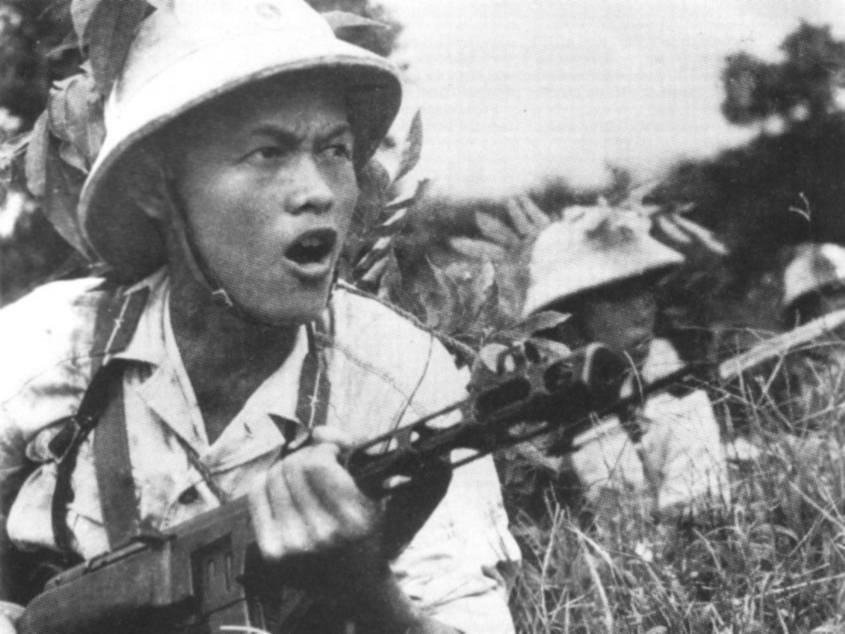
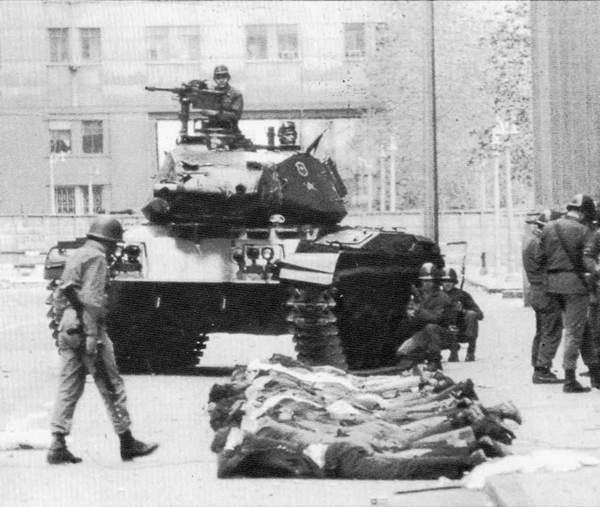
Left: A platoon of the People's Army of Viet Nam, which in 1975 won the Viet Nam War and vanquished the foreign aggressors. It is estimated that more than three million Vietnamese died in the war and today they continue to suffer the effects of weapons used by the U.S. and its allies, including chemical weapons. Right: The CIA-backed overthrow of the democratically elected government of Chile, 1972, in which many were disappeared, thousands killed and tens of thousands tortured, and many, many more forced to flee the country. These are just two examples of the crimes committed by the U.S. in the name of upholding "freedom" and "democracy."
Note
1. In 2012, Minister Jason Kenney appointed Linda Frum as Co-Chair of the Advisory Council for the 2013 Task Force for International Cooperation on Holocaust Education, Remembrance, and Research. Frum's brother David wrote speeches for George W. Bush.
Official Use of Disinformation About
Soviet-German
Non-Aggression
Pact


Great Soviet victory against the Nazis at Stalingrad (left); Hoisting the Banner of Peace and Democracy: Red Army soldiers raise the red flag over the Reichstag in Berlin, May 2, 1945, signifying victory over fascism in Europe (right).
On August 23, 1939, the Soviet Union signed what is now known as the Molotov-Ribbentrop Non-Aggression Pact with Germany which stipulated that Germany would not attack the Soviet Union and the Soviet Union would not attack Germany. Future events proved the farsightedness of Stalin in signing the pact. It was the best of all available alternatives. It provided the Soviet Union with 22 months of relative peace so as to prepare herself to withstand the inevitable German invasion and it put an end to the Anglo-American and French policy of egging Hitler toward the East in what would have resulted in a completely isolated Soviet Union facing massive German forces.
Wild claims have long been made by imperialist historians that the Soviet Union believed that signing the Pact would stop the Nazis from attacking them and that, as a result, the Soviets were taken completely by surprise when the Nazis did attack on June 22, 1941. Nothing could be further from the truth. The preparations the Soviets made attest to this. No less a person than the U.S. Ambassador to the Soviet Union from 1936-1938, Joseph Davies, made it clear that the Soviet Union was very well-prepared for a Nazi attack. Davies wrote in an official report to the U.S. Department of State on July 9, 1941: "The plan of campaign which the war strategists of the Soviet Union had laid out did not contemplate or permit a decisive battle on the western front, as some of the strategists and commentators over here [in the U.S.] seemed to fear. The plan called for a definite strategy of withdrawal to draw the enemy into the interior; extend his line of communication and supply, and gradually to wear him down by making him pay dearly for each advance."[1] History has validated the boldness of the Soviet plan.
The Nazis did eventually invade the Soviet Union as expected but not until June 22, 1941 in the largest German military operation of the war. The heroic and protracted Soviet resistance against the Nazis culminated in the great Soviet victory at Stalingrad on February 2, 1943, that concluded with the encirclement and surrender of a German army of 300,000 troops. This was followed by another decisive Soviet victory at Kursk. These triumphs began a powerful counteroffensive that drove the German Hitlerites steadily backward until the final demise of the Third Reich in Berlin. On May 9, 1945 the anti-fascist forces of the world with the Soviet Union and communists of all lands at the head of the Resistance Movement declared victory over the Hitlerite Nazis. Fascist Germany acknowledged defeat and declared unconditional surrender.
 Panzer units move through Pruzhaney in western Belarus, June 1941, as the Nazi invasion of the USSR begins. |
Completely ignoring these
undisputed facts, the
reactionaries of today are
using the anniversary of the non-aggression pact
not to once again
acclaim the
great victory of the world's people over Nazi
Germany but to follow
their
mentor Goebbels by making such fascist claims as,
"On August 25, 1939
the
Soviet Union and Germany signed the
Molotov-Ribbentrop Pact which led
to
the second world war, the killing of millions of
people and the
Holocaust."[2]
Such big lies should not be treated with indifference because they are not harmless and need to be opposed. The aim can only be to create a climate which will assist the same kind of Hitlerite and fascist forces to rise once again. In fact, those carrying out this propaganda today are the descendants of the very same fascist forces.
To suggest that Stalin's signing of the
non-aggression
pact with Germany
was the cause of World War II is the basest
infamy. First, it should be
noted
that Britain and France had already issued a joint
declaration of
non-aggression
with the Germans in 1938. Of all the
non-aggressive Great Powers in
Europe,
the Soviet Union was the last to agree to a pact
with the Germans.
Second,
"The history of events in 1937, both before and
after Hitler's
occupation of
Austria in March show that the Soviet Union, as it
had done in earlier
years,
made many efforts to persuade Britain and France
to maintain collective
mutual assistance and in particular to carry out
their undertaking to
defend
Czechoslovakia against aggression....The Soviet
Union was not only
willing to
join forces with France to defend Czechoslovakia,
if France would keep
her
word, but was prepared to defend Czechoslovakia on
her own, even if
France
refused."[3]
 Joseph Stalin at meeting of the Supreme Soviet in 1938. |
All these efforts failed and the British and French refused to sign the collective mutual assistance pact with the Soviet Union. Instead, they signed the September 29, 1938, Munich Pact with Germany which permitted Germany to incorporate the Sudeten, ordered the Czechs not to resist Nazi aggression and gave the Nazis the green light to launch their attacks across Europe.
Of course the reactionaries never want to discuss the Munich Pact because it was such a blatant betrayal of the world's people that even Winston Churchill accused Prime Minister Chamberlain in the British Parliament: "You were given the choice between war and dishonour. You chose dishonour and you will have war."
It is indisputable that faced with the British and French betrayal, the Soviet Union had no choice but to take whatever measures it could to defend itself and the cause of peace.
All these facts can be verified. They are all available in reports, speeches, accounts and documents of that time. Just to give one example, Memo #8604, which was sent to Moscow by Russian intelligence from Prague several days before the signing of the Munich Agreement reads: "On September 19, British Ambassador Newton and French Ambassador De Lacroix conveyed to Milan Hodza (Czechoslovak Prime Minister from 1935 to 1938) the following on behalf of Chamberlain and Daladier, respectfully: 'Guided by the lofty principles of preserving peace in Europe, they consider it necessary for Germany to incorporate the Sudeten region. A system of mutual aid pacts with other countries should be cancelled.'"[4]
The nefarious actions of the Anglo-Americans and the French, behind the back of the Soviet Union, which had mutual aid agreements with Czechoslovakia and France, destroyed the existing elements of the collective resistance system against Nazi Germany. It was the Munich Pact which was the final cowardly act that led to the Second World War, the killing of millions of people, and the Holocaust. The judgment of history points to the truth about the Anglo-American and French betrayal of the world's people and to the truth about the heroic role of the Soviet Union and J.V. Stalin in defeating the Nazis. "In the end, the resistance of the Soviet peoples led by Stalin and the Communist Party broke the back of the Nazi aggressors. Some 50 million people died and another 35 million were seriously wounded during the Anti-Fascist War with the peoples of the Soviet Union bearing the brunt of the casualties."[5]
Notes
1. Davies, Joseph
(1941).
Mission to Moscow. Pocket
Book. P. 431.
2. "Stalin 'planned to send a
million
troops to stop
Hitler if Britain and
France agreed pact': Stalin was 'prepared to
move more than a million
Soviet
troops to the German border to deter Hitler's
aggression just before
the Second
World War,'" Nick Holdsworth, Telegraph UK,
October 18,
2008.
3. Hardial Bains. Causes
and
Lessons of the Second
World
War. Toronto: MELS, 1990, p. 54.
4. "Russian Foreign
Intelligence Service
Declassifies
Munich Agreement
Papers," Valery Harmolenko, RIA Novosti,
September 29, 2008.
5. "The Overthrow of the
Imperialist
System Is the Only
Guarantee for
Peace," TML Daily, May 11, 2010.
European Union, U.S. and Canada Remain Silent about Estonian Glorification of Nazi Collaboration
On July 27, 2013, the annual get-together of the former Estonian 20th Waffen Grenadier Division of the Nazi SS (Schutzstaffel or "protective squadron") was held in the Sinimae Hills of eastern Estonia, site of a fierce battle between the Red Army and Nazi troops, including the Estonian SS division, in 1944. The Soviet victory liberated the Klooga concentration and murder camp, rescuing 2,000 prisoners. Sinimae is a major neo-Nazi celebration, held since 1994, which openly uses banned Nazi symbols such as the swastika and is attended by Nazis from all over the world. The celebration includes the Erna military competition, named after the reconnaissance group that provided the Nazis with data about the Red Army during the Second World War. In the past, the Estonian state has actively protected the Waffen-SS veterans' rally by banning anti-Nazi protest rallies and by arresting prominent anti-Nazi activists.
The Hitlerites began creating non-German Waffen-SS divisions in 1940, which by the end of the Second World War made up about 60 per cent of the Waffen-SS. During the war, 80,000 Estonians joined the Nazi forces and another 3,000 fought against the USSR in the Finnish Army. As did the other Waffen-SS Divisions, the Estonian Division committed countless war crimes, yet no Estonian government since the so-called independence in 1991 has prosecuted a single Nazi war criminal, some of whom, such as Martin Jensen who (died in 1992), fled to Canada under the protection of the Canadian state. The Estonian Waffen-SS massacred civilians in Estonia, the Soviet Union, Belarus, Ukraine, and Poland; attacked small groups of Red Army soldiers and killed Communist Party and Soviet activists; slaughtered Jews, ethnic Russians, prisoners of war, and any peasants who supported land reform; and participated in the transportation of civilians to concentration camps such as Klooga for execution. The President of the Middle East Institute Yevgeny Satanovsky (former president of the Russian Jewish Congress) said that the Waffen-SS was the same structure as the "death squads," i.e., killing squads that hanged and burned old men, women and children in the territories occupied by Nazis.[1]
Executives of Estonia's ruling political party have in the past officially attended the July Nazi gathering at Sinimae. In 2011, Prime Minister Andrus Ansip feebly claimed that the meeting had nothing to do with Nazi ideology, even though the Waffen-SS was the armed military force of the SS, an organ of Hitler's Nazi Party commanded by Heinrich Himmler. This year the Estonian state kept a low profile with only the Minister of Defense Urmas Riensalu sending greetings to the gathering and no government officials onsite. The Russian Foreign Ministry sent a protest but no objections emanated from the European Union.
Although the Nuremburg Trials clearly declared
the
Waffen-SS to be
a criminal organization, the Estonian ruling
circles defend the
Waffen-SS
criminals with the well-worn lies that they were
either coerced into
joining
the Nazis or else were patriots fighting against
"Soviet occupation"
for
Estonian independence.[2] These
fabrications are readily
exposed by the
fact that 30,000 Estonians voluntarily fought on
the Red Army side
against
the Nazi occupiers, as well as by the fact that it
was obvious that
under
Hitler's Germany, Estonia could only ever have
been a vassal state of
the
Third Reich.
The openly pro-Nazi orientation of the Estonian ruling circles became clear soon after 1991. On June 26, 1999, during the Mart Laar administration, the remains of Estonian Waffen-SS Colonel Alfons Rebane were transferred from Germany to Tallinn's Metsakalmistu cemetery after a state funeral, despite an organized protest.[3] In 2002, Mart Laar and Minister of Foreign Affairs Tirvimi Velliste characterized the Battle of Sinimae as a "second war of liberation." In 2005, the Estonian state funded a museum in Lagedi which memorialized the Waffen-SS Division. In 2006, Laar declared that sooner or later a law would be passed recognizing those Estonians who fought for Nazi Germany. In April 2007, Estonian authorities ordered the dismantling of a Soviet war memorial in the capital, Tallinn, which commemorated the victory over Nazism. Thousands of people attempted to protect the monument but police arrested over 1,000 activists and killed one Russian national.
 In 2007, the Bronze Soldier, the Estonian war memorial to Soviet soldiers who liberated the capital Tallinn was removed from a place on honour in central Tallinn following pressure from anti-Soviet forces and taken to an out of the way military cemetery, pictured above. |
These forces want to obliterate the memory of the heroic role the communists played. But behind this, it is clear that the revival of anti-communism by the most reactionary sectors of the ruling classes which have usurped positions of power in Europe and North America is a deliberate concerted attack. This assault is meant to smash the resistance of the working class in the advanced capitalist countries and of the peoples of the world to the global neo-liberal anti-social offensive and U.S. imperialist plans to redivide the world. Remnants of the family of the Russian Czar and his retinue and similar so-called royal families of Europe, the same aristocratic dregs that funded the earliest rise of the Nazi Party, continue to scheme. They wish to repossess the properties justly expropriated by the people during the Russian Revolution and as a result of the peoples' striving for empowerment during and after World War II.
Monument to Ernst Thaelmann in Berlin, Germany. |
This is why these representatives of the monopolies and their parties and governments are now endorsing openly fascist resolutions. Such statements declare the deeds of the communists such as events which permitted the great Second World War victories at Stalingrad and Kursk to be crimes against humanity "worse" than the crimes of the Nazis. They condone the crimes of the Nazis, claiming their aim was to save humanity from Bolshevism. But the peoples of the world will never conciliate with new imperialist wars of occupation and other crimes against the peace and humanity carried out in the name of freedom, democracy and human rights. The peoples of the world despise both the old and new Nazis. Every effort must be made to oppose the comparison of the deeds of the communists with the crimes of the Nazis, otherwise we face worldwide disaster in the same way that the Anglo-American policy of conciliation with the Hitlerites inexorably led to the tremendous calamities and suffering during the Second World War.
Notes
1. For more details of
these
war crimes, see Estonia:
The Bloody Trace of
Nazism, 1941-44. The document can be found at
http://common.regnum.ru/documents/eston.pdf
2. In 1950, the U.S.
High
Commissioner
in Germany, John
J. McCloy,
who later pardoned all the Nazi war criminals
jailed by the Nuremburg
Trials,
began official "rehabilitation" of the Baltic
Waffen Divisions by
declaring that
they were "separate" from the Nazi SS and
therefore were not a movement
"hostile to the Government of the United
States." As is well-known, the
U.S.
imperialists recruited thousands of Nazis after
the Second World War,
e.g.,
through Operation Paperclip to work on the
American missile program.
3. Laar's reactionary
credentials are
prodigious. He is
on the international
board of the U.S. Victims of Communism Memorial
Foundation Committee,
which is the inspiration for the Canada-based
Tribute to Liberty's
anti-communist monument campaign. He is also a
member of the misnamed
International Committee for Democracy in Cuba,
billionaire George
Soros'
so-called Human Rights Foundation, the
anti-communist Mount Pelerin
Society
founded by Friederich Hayek, and many other
similar organizations.
Historical Review
The Hitlerite Pretext of
Saving the World From Communism
TML Weekly is printing below an extract from the chapter on the Second World War from the book The Great Conspiracy by Michael Sayers and Albert E. Kahn.
***
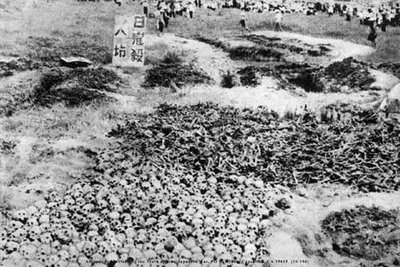 Another illustration of the crimes of the real enemies of the peoples of the world -- field of skeletons from Japanese massacre at Nanking, China in 1937. |
The Second World War began in 1931 with the
Japanese invasion of Manchuria on the pretext of
saving Asia from
Communism. Two years later, Hitler overthrew the
German Republic on the
pretext of saving Germany from Communism. In 1935
Italy invaded
Ethiopia
to save it from "Bolshevism and barbarism." In
1936 Hitler
remilitarized the
Rhineland; Germany and Japan signed the
Anti-Comintern Agreement; and
German and Italian troops invaded Spain on the
pretext of saving it
from
Communism.
In 1937 Italy joined Germany and Japan in their Anti-Comintern Agreement; Japan struck again in China, seizing Peiping, Tientsin and Shanghai [Beijing, Tianjin and Shanghai -- TML Ed.]. The following year, Germany seized Austria. The Berlin-Rome-Tokyo Axis was formed "to save the world from Communism."
Addressing the Assembly of the League of Nations in September 1937, the Soviet Foreign Minister Maxim Litvinov said:
We know three states which in recent years have made attacks on other states. With all the difference between the regimes, ideologies, material and cultural levels of the objects of attack, all three states justify their aggression by one and the same motive -- the struggle against Communism. The rulers of these states naively think, or rather pretend to think, that it is sufficient for them to utter the words "anti-Communism," and all their international felonies and crimes will be forgiven them!
Under the mask of the Anti-Comintern Agreement, Germany, Japan and Italy were marching towards the conquest and enslavement of Europe and Asia.
Two possible courses faced the world: unity of all nations opposed to the Nazi, Fascist and Japanese aggression and the halting of the Axis war menace before it was too late; or disunity, the piecemeal surrender to aggression, and inevitable Fascist victory. The Axis Propaganda Ministries, the agents of Leon Trotsky, French, British and American reactionaries all combined in the international Fascist campaign against collective security. The possibility of unity against aggression was attacked as "Communist propaganda"; dismissed as a "utopian dream"; assailed as an "incitement to war." In its place was offered the policy of Appeasement, the scheme of turning the inevitable war into a united onslaught against Soviet Russia. Nazi Germany made the most of this policy.
The British Prime Minister, Neville Chamberlain, the hero of appeasement, said collective security would divide Europe into "two armed camps."
The Nazi newspaper Nachtausgabe declared in February 1938:
We know now that the English Premier, like ourselves, regards Collective Security as nothing but nonsense.
Speaking in Manchester on May 10, 1938, Winston Churchill replied:
We are told that we must not divide Europe into two armed camps. Is there then to be only one armed camp -- the Dictators' armed camp and a rabble of outlying peoples, wandering around its outskirts, wondering which of them is going to be taken first and whether they are going to be subjugated or merely exploited?
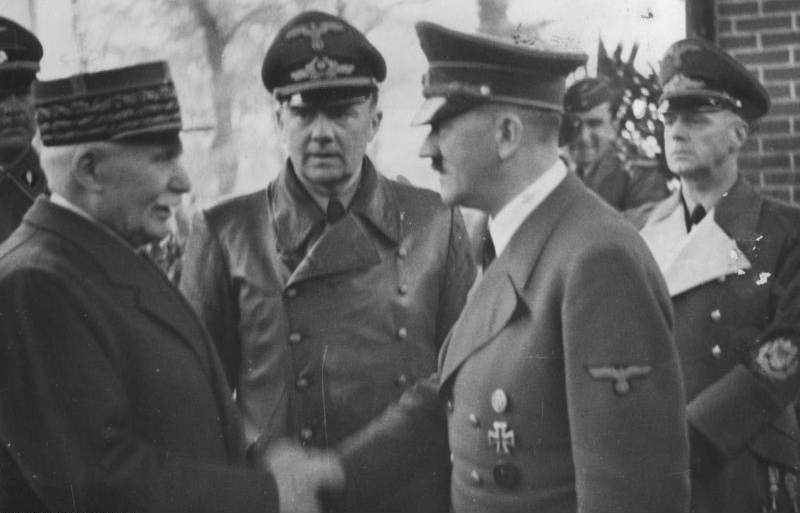 Philippe Pétain, leader of the collaborationist French Vichy regime, and Adolf Hitler, October 1940 in Montoire-sur-le-Loir, France. |
Churchill was called a "war-monger." ...
In September 1938, the policy of Appeasement reached its culmination. The Governments of Nazi Germany, Fascist Italy, Great Britain and France signed the Munich Pact -- the anti-Soviet Holy Alliance of which world reaction had been dreaming since 1918.
The Pact left Soviet Russia without allies. The Franco-Soviet Treaty, cornerstone of European collective security, was dead. The Czech Sudetenland became part of Nazi Germany. The gates of the East were wide-open for the Wehrmacht.[1]
"The Munich Agreement," wrote Walter Duranty in The Kremlin and the People, "seemed to mark the greatest humiliation which the Soviet Union had suffered since the Treaty of Brest-Litovsk."
The world awaited the Nazi-Soviet war.
Returning to England, waving a scrap of paper in his hand, with Hitler's signature on it, Neville Chamberlain cried:
"It means peace in our time!"
Twenty years before, the British spy Captain Sidney George Reilly had cried: "At any price this foul obscenity which has been born in Russia must be crushed.... Peace with Germany! Yes, peace with anybody!... Peace, peace on any terms -- and then a united front against the true enemies of mankind!"
On June 11, 1938, Sir Arnold Wilson, Chamberlain's supporter in the House of Commons, declared:
Unity is essential and the real danger to the
world
today does not
come from Germany or Italy ... but from Russia.
But the first victims
of the
anti-Soviet Munich Pact were not the Soviet
peoples. The first victims
were the
democratic peoples of Europe. Once again, the
anti-Soviet facade
covered a
betrayal of democracy.
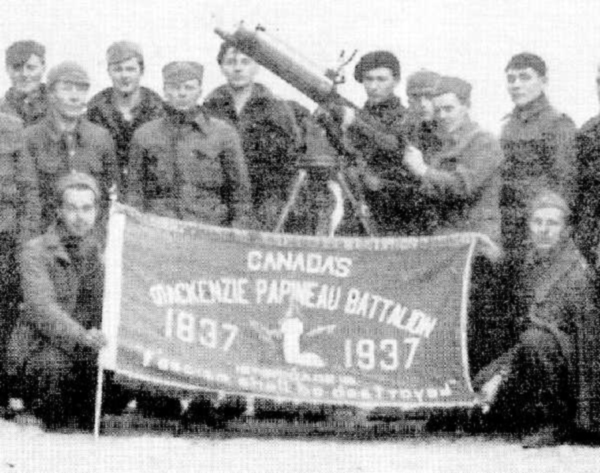 Canadian communists and anti-fascists fought in the Internationalist Mackenzie-Papineau Brigade during the Spanish Civil War. |
In February
1939, the British and French Governments
recognized the
Fascist dictatorship of Generalissimo Franco as
the legitimate
government of
Spain. In the last days of March, after two and a
half years of epic,
agonizing
struggle against overwhelming odds, Republican
Spain became a Fascist
province.
On March 15, Czechoslovakia ceased to be an independent state. Nazi Panzer divisions rumbled into Prague. The Skoda munitions works and twenty-three other arms factories, comprising an armaments industry three times as great as that of Fascist Italy, became Hitler's property. The pro-Fascist General Jan Sirovy, one-time leader of the Czech interventionist armies in Soviet Siberia, handed over to the German High Command the arsenals, storehouses, a thousand planes and all the first-rate military equipment of the Czechoslovakian Army.
On March 20, Lithuania surrendered its only port, Memel, to Germany.
On Good Friday morning, April 7, Mussolini crossed the Adriatic and invaded Albania. Five days later, King Victor Emmanuel accepted the Albanian crown.
From Moscow, even as Hitler was moving into Czechoslovakia, Stalin warned the appeasement politicians of England and France that their anti-Soviet policy would end in a disaster for themselves. Stalin spoke in Moscow on March 10, 1939, before the Eighteenth Congress of the Communist Party of the Soviet Union.
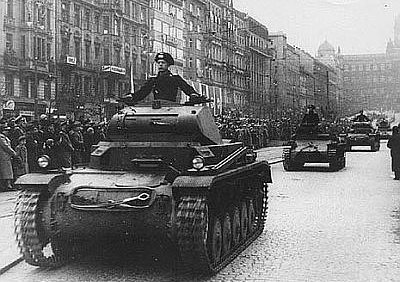 Nazis invade Prague, Czechoslovakia, March 15, 1939. |
The undeclared war, said Stalin, which the Axis powers were already waging in Europe and Asia, under the mask of the Anti-Comintern Pact, was directed not only against Soviet Russia but also, and now in fact primarily, against the interests of England, France and the United States.
"The war is being waged," said Stalin, "by aggressor states, which in every way infringe upon the interests of the non-aggressive states, primarily England, France and the U.S.A., while the latter draw back and retreat, making concession after concession to the aggressors ... without the least attempt at resistance and even with a certain amount of connivance. Incredible but true."
The reactionary politicians in the Western democracies, particularly in England and France, said Stalin, had rejected the policy of collective security. Instead, they still dreamed of an anti-Soviet coalition camouflaged by diplomatic phrases like "appeasement" and "non-intervention." But this policy, said Stalin, was already doomed. Stalin added:
... certain European and American politicians and newspaper writers, having lost patience waiting for 'the march on the Soviet Ukraine,' are themselves beginning to disclose what is really behind the policy of nonintervention. They are saying quite openly, putting it down in black and white, that the Germans have cruelly 'disappointed' them, for instead of marching farther east, against the Soviet Union, they have turned west, you see and are demanding colonies. One might think that the districts of Czechoslovakia were yielded to Germany as the price of an undertaking to launch war on the Soviet Union, and that now the Germans are refusing to meet their bills....
"Far be it from me," said Stalin, "to moralize on the policy of non-intervention, to talk of treason, treachery and so on. It would be naive to preach morals to people who recognize no human morality. Politics is politics, as the old, case-hardened bourgeois diplomats say. It must be remarked, however, that the big and dangerous political game started by the supporters of the policy of non-intervention may end in a serious fiasco for them.
The Soviet Union still wanted international co-operation against aggressors and a realistic policy of collective security; but, Stalin made clear, such co-operation must be genuine and wholehearted. The Red Army had no intention of becoming a cat's-paw for the appeasement politicians of England and France. Finally, if the worst came, the Red Army was confident of its own strength and of the unity and loyalty of the Soviet people. As Stalin put it:
... in the case of war, the rear and front of our army ... will be stronger than those of any other country, a fact which people beyond our border who love military conflicts would do well to remember.
But Stalin's blunt, significant warning was ignored.
In April 1939, a poll of British public opinion showed that 87 per cent of the English people were in favor of an Anglo-Soviet alliance against Nazi Germany. Churchill saw the Anglo-Soviet rapprochement as "a matter of life or death." In a speech on May 27, Churchill sharply declared:
If His Majesty's government, having neglected our defenses, having thrown away Czechoslovakia with all that Czechoslovakia means in military power, having committed us to the defense of Poland and Roumania, now rejects and casts away the indispensable aid of Russia, and so leads in the worst of ways into the worst of wars, they will have ill-deserved the generosity with which they have been treated by their fellow countrymen.
On July 29 David Lloyd George backed up Churchill's pleas with these words:
Mr. Chamberlain negotiated directly with Hitler. He went to Germany to see him. He and Lord Halifax made visits to Rome. They went to Rome, drank Mussolini's health and told him what a fine fellow he was. But whom have they sent to Russia? They have not even sent the lowest in rank of a Cabinet minister; they have sent a clerk in the Foreign Office. It is an insult.... They have no sense of the proportion or of the gravity of the whole situation when the world is trembling on the brink of a great precipice....
The voices of the British people and of English statesmen like Churchill and Lloyd George went unheeded.
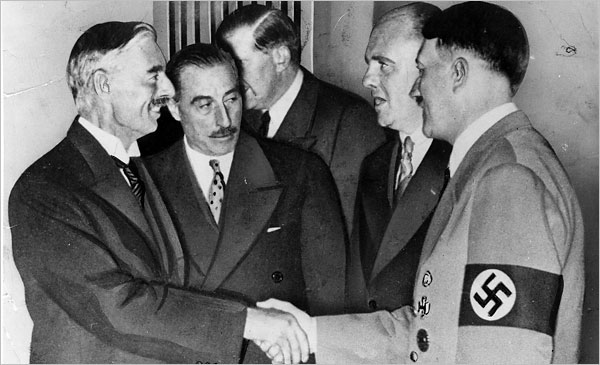 British Prime Minister Neville Chamberlain shakes hands with Hitler after treacherously signing the Munich Pact in 1938. |
"A hard and fast alliance with Russia," observed the London Times, "would hamper other negotiations."...
As the summer of 1939 drew to a close and war in Europe loomed ever nearer, William Strang, a minor Foreign Office official whom Chamberlain had sent to Moscow, remained the only British representative carrying on direct negotiations with the Soviet Government. Public pressure forced Chamberlain to make another show of negotiations with Russia. On August 11, a British military mission arrived in Moscow to conduct joint staff talks. The British mission had traveled from London on a thirteen-knot vessel, the slowest possible means of transport. When the mission arrived, the Russians learned it had no more authority than Strang to sign any agreement with the Soviet Government....
Soviet Russia was to be isolated and left alone to face a Nazi Germany passively, if not actively, supported by the Munich minded governments of Europe.
Joseph E. Davies later described the choice that the Soviet Government was forced to make. Writing to President Roosevelt's advisor, Harry Hopkins, the former Ambassador to the Soviet Union stated on July 18, 1941:
From my observations and contacts, since 1936, I believe that outside of the President of the United States alone no government in the world saw more clearly the menace of Hitler to peace and the necessity for collective security and alliances among non-aggressive nations than did the Soviet government. They were ready to fight for Czechoslovakia. They cancelled their non-aggression pact with Poland in advance of Munich because they wished to clear the road for the passage of their troops through Poland to go to the aid of Czechoslovakia if necessary to fulfill their treaty obligations. Even after Munich and as late as the spring of 1939 the Soviet government agreed to join with Britain and France if Germany should attack Poland or Roumania, but urged that an international conference of non-aggressor states should be held to determine objectively and realistically what each could do and then serve notice on Hitler of their combined resistance.... The suggestion was declined by Chamberlain by reason of the objection of Poland and Roumania to the inclusion of Russia....
During all the spring of 1939 the Soviets tried to bring about a definite agreement that would assume unity of action and co-ordination of military plans to stop Hitler.
Britain ... refused to give the same guarantees of protection to Russia with reference to the Baltic states which Russia was giving to France and Britain in the event of aggression against Belgium or Holland. The Soviets became convinced, and with considerable reason, that no effective, direct and practical, general arrangement could be made with France and Britain. They were driven to a pact of non-aggression with Hitler.
Twenty years after Brest-Litovsk, the anti-Soviet politicians of Europe had again forced Soviet Russia into an undesired, self-defensive treaty with Germany.
On August 24, 1939, the Soviet Union signed a Non-aggression Pact with Nazi Germany.
Note
1. On September 24, 1938, with the Nazis moving on Czechoslovakia, the leading editorial in the Socialist Appeal, New York Trotskyite newspaper declared: "Czechoslovakia is one of the most monstrous national abortions produced by the labors of the infamous Versailles conference.... Czechoslovakia's democracy has never been more than a shabby cloak for advanced capitalist exploitation.... This perspective necessarily entails the firmest revolutionary opposition to the Czechoslovakian bourgeois state, under any and all circumstances."
Under such pseudo-revolutionary slogans, the Trotskyites throughout Europe and America carried on an incessant campaign against the defense of small nations from Axis aggression and against collective security. As Abyssinia, Spain, North and Central China, Austria and Czechoslovakia were invaded one after another by Germany, Italy and Japan, the members of Trotsky's Fourth International spread throughout the world the propaganda that collective security was an "incitement to war." Trotsky asserted "the defense of the national State" was really "a reactionary task." In his pamphlet, The Fourth International and the War, which was used as basic propaganda material by the Trotskyites in their fight against collective security, Trotsky wrote:
"The defence of the national State, first of all in Balkanized Europe -- is in the full sense of the word a reactionary task. The national State with its borders, passports, monetary system, customs and the army for the protection of customs has become a frightful impediment to the economic and cultural development of humanity. Not the defence of the national State is the task of the proletariat but its complete and final destruction."
Trotsky's followers and sympathizers in Europe and America conducted a bitter struggle against the Popular Front in France, the Spanish Republican Government and other patriotic, anti-Fascist mass movements which were trying to achieve national unity within their own countries and collective security agreements with the Soviet Union. The Trotskyite propaganda declared these movements would only involve their countries in war. "The Stalinist version of the United Front," declared C.L. James, a leading British Trotskyite, "is not unity for action but unity to lead all workers into imperialistic war."
Trotsky himself ceaselessly "warned" against the "dangers" involved in an Axis defeat at the hands of the nonaggressor nations. "A victory of France, of Great Britain and the Soviet Union ... over Germany and Japan," Trotsky declared at the Hearings in Mexico in April 1937, "could signify first a transformation of the Soviet Union into a bourgeois state and the transformation of France into a fascist state, because for a victory over Hitler it is necessary to have a monstrous military machine.... A victory can signify the destruction of fascism in Germany and the establishment of fascism in France."
In this way Trotsky and his fellow propagandists worked hand-in-glove with the appeasers and with the Axis Propaganda Ministries to persuade the people of Europe that collective security was war-mongering and that these agencies attempting to achieve it were "Stalinist" tools.
(The Great Conspiracy, Michael
Sayers
and Albert E. Kahn,Chapter 22: The
Second
World War 1946)
Canada's Use of Emergency Powers to
Attack Communists,
Trade
Unionists, and
Anti-Fascist Ukrainians
- Minister Jason Kenney on anti-communist monument, August 23, 2013
The Canadian government has a long history of
using
"legal means" to
attack the communists and progressive people,
under a variety of
excuses. One
well-known example is Trudeau's implementation of
the War
Measures Act
in 1970 after declaring a so-called state of
apprehended insurrection.
The War Measures Act was inaugurated in 1914 after the outbreak of the First World War, and gave sweeping emergency powers to the federal Cabinet, allowing it to govern by decree if it perceived the existence of "war, invasion or insurrection, real or apprehended." The Act stayed in force in Canada from 1914-1920. With the victory of the Bolshevik Revolution in 1917, additional regulations and orders were added, forbidding membership in communist and socialist organizations. The Emergency Powers Act, an offshoot of the War Measures Act, was put in force from 1951-54, during the U.S.-led aggression against the Korean people.
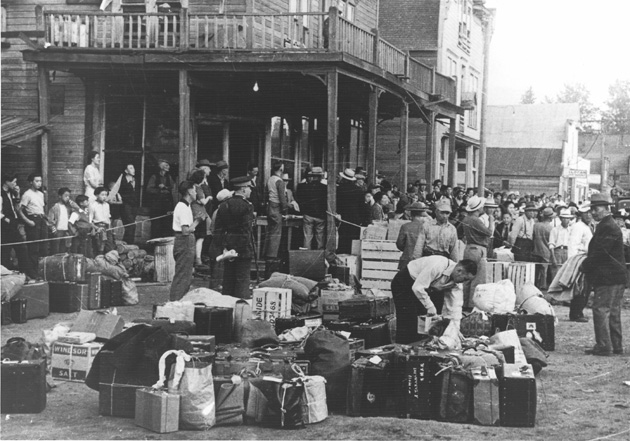 The mass internment of Canadians of Japanese, German and Italian origin, as well as communists and others, was carried out under the Defence of Canada Regulations. Shown here, the interment of Japanese Canadians in BC. |
The 1939 Defence of Canada Regulations (DOCR)
legalized
repressive
state measures such as waiving of habeas
corpus, waiving the right to
trial,
internment, bans on political groups, restrictions
of free speech
including
banning of certain publications, and the
confiscation of property.
Section 21
of the DOCR allowed the federal Minister of
Justice to detain without
charge
anyone who might act "in any manner prejudicial to
the public safety or
the
safety of the state." The War
Measures Act remained in force in Canada
until
the end of 1945, after which the National
Emergency
Transitional
Powers
Act
replaced it until March 31, 1947. The Continuation
of
Transitional
Measures
Act was then enacted, maintaining certain
wartime orders and
regulations until
April 30, 1951, by which time Canada was embroiled
in the U.S.-led
aggression against Korea, part of its "containment
of communism"
strategy.
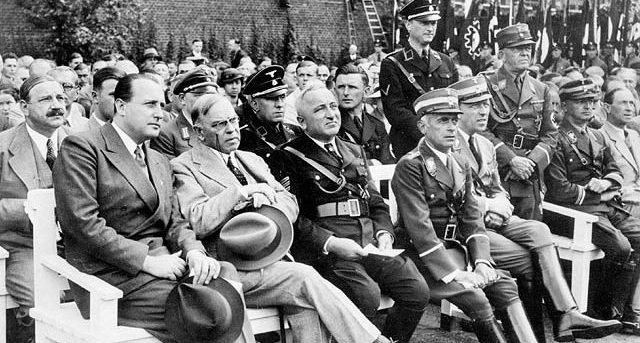
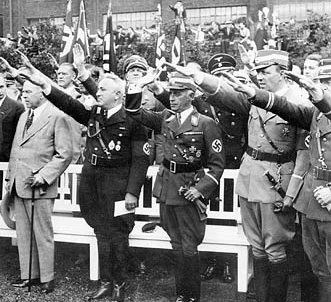
Prime Minister Mackenzie King consorts with Nazi regime of Adolf Hitler, June 1937, Olympic Stadium in Berlin, Germany.
The King government's official line was that the
wartime
DOCR were
intended to suppress anyone obstructing the
mobilization of Canadians
in
support of the war effort against Germany.
However, the government
mainly
used the DOCR to attack those who were staunch
anti-fascists and who in
no
way sympathized with Nazi aggression but who,
until Nazi Germany
invaded
the Soviet Union, regarded the war as another
imperialist war for
redivision
of the world. The people mainly targeted by the
state were communists,
trade
unionists, and the anti-fascist Ukrainians because
King and others in
the ruling
circles saw communism as a far greater threat to
Canada than
fascism.[1] The
King government had never opposed fascism, failing
to act against
Italy's
fascist invasion of Ethiopia in 1935, failing to
oppose Franco's
fascist uprising
in Spain, and supporting British and French
appeasement of Hitler.
Although
Canada was not officially at war with the Soviet
Union, the ruling
circles
considered the Soviet Union an "unofficial" enemy
because of its
socialist
project. Meanwhile, the Canadian communist party
maintained close
relations
with the Soviet Union.
Repression of the communists under the DOCR began
in
November 1939
with the forced closing of the communist
newspapers The Clarion
and Clarté. The internment of communists
began in May
1940
with a judge's ruling during a trial, although it
was not until June 6
that the
King cabinet issued an official order-in-council
banning the Communist
Party
of Canada, the Young Communist League (YCL), and
thirteen other
organizations, including the anti-fascist
Ukrainian Labor Farmer Temple
Association.[2] RCMP officers,
empowered to issue their
own search
warrants,
were ordered to arrest members of the banned
organizations, as well as
anyone
who distributed literature or spoke publicly.
Anyone who advocated for
or
defended the principles or policies of the banned
organizations was to
be
presumed guilty unless proven innocent. The RCMP,
which had been
harassing
the party since its founding in 1921, began
arresting suspected
communists
who were sent to internment camps in Kananaskis,
Alberta, and Petawawa,
Ontario, and an unused jail in Hull, Quebec.[3]
Following their release
in
1942, the communists once again took a leadership
role in the
anti-fascist
struggle and many served bravely in the Canadian
forces overseas, such
as steelworker organizer, Dick Steele, who was
killed in the
Falaise
Pocket in August 1944 during a major allied
victory.
The DOCR were also used to attack trade union
leaders.
Wartime inflation
from 1939-41 eroded workers' wages which, along
with labour shortages,
set
off an upsurge in union militancy and organizing.
The state used the
DOCR
as a weapon to block organizing and to undermine
strikes and picketing.
To
give one example, in December 1939, Canadian
Congress of Industrial
Organizations (CIO) secretary C.H. Millard
was arrested for telling Timmins, Ontario
steelworkers that "[we]
should have
democracy here in Canada before we go to Europe to
defend it."
Communist
trade unionists were singled out by the state as
the main "agitators"
in the
labour movement because they were not only active
union members, but
leaders and organizers of unions such as the
Canadian Seamens' Union
(CSU),
the United Electrical Workers (UEW), the
International Woodworkers of
America (IWA), the Mine, Mill and Smelter Workers,
the Steel Workers
Organizing Committee (SWOC), and the United
Automobile Workers (UAW).
To give one example, on June
20, 1941, the RCMP arrested UEW president, C.S.
Jackson, on direct
orders
from Minister of Labour Alexander McLarty and
Minister of Munitions and
Supply C.D. Howe because UEW was on strike at the
Toronto General
Electric Plant
and organizing workers at Westinghouse in
Hamilton.
The DOCR were also used to attack and smash
progressive
organizations,
in particular the anti-fascist Ukrainian Labor
Farmer Temple
Association
(ULFTA) which at the time had about 20,000 members
across Canada and
was
very influential in the Ukrainian-Canadian
community. On June 5, 1940,
the
government banned the ULFTA, closing its halls and
interning thirty-six
of the
most experienced anti-fascist Ukrainian leaders on
trumped up charges.
Labour
temples, which had been built and financed by the
Ukrainian workers,
were
raided from one end of Canada to the other,
printing presses were
stolen and
many libraries were burned or shredded, similar to
Nazi book burnings
in
Germany. The government then turned over some of
the ULFTA's principal
halls and properties to the pro-fascist,
anti-Soviet Ukrainian National
Federation or to other rivals of the actual owners
for next to
nothing.[4] Mass
demonstrations were held against the illegal
confiscations, resulting
in some
halls simply being padlocked. It was not until the
summer of 1942 that
the
anti-fascist leaders of the ULFTA were
"conditionally" released" from
internment, however, their organizations and
newspapers remained
banned, and
the ULFTA property was never restored.[5]
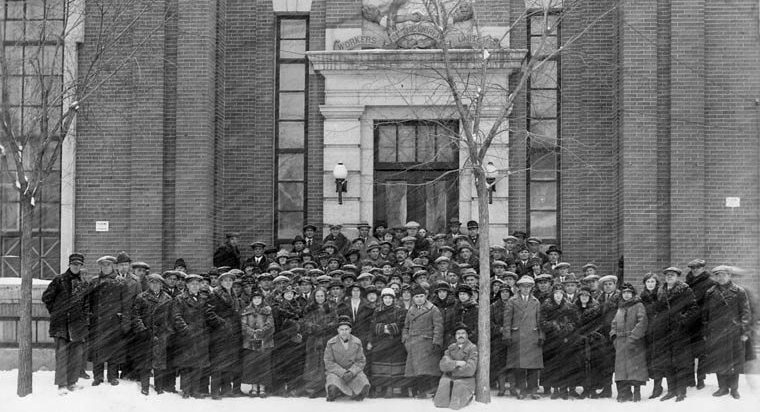
6th Convention, Ukrainian Labour Farmer Temple Association, in front of the Ukrainian Labour Temple
in Winnipeg, Manitoba, January 26-28, 1925.
Surveillance of Canadians by their government has
been
broad and ongoing, and has only come to light
occasionally. Take the
case of internationally known Canadian author
Farley Mowat. In 1985, as
part of a book tour, Mowat was to make a visit to
California, but was
barred from entering the U.S. by customs
officials. It later came to
light that Mowat was on a watch list based on
files passed to U.S.
authorities by the RCMP. News reports about the
Canadian government
spying on its citizens came to light in 2001. It
was reported that the
RCMP set up a Public Order Program in the spring
of 2001 to exchange
secrets on protestors in the lead up to the G8
Summit in Kanaskis,
Alberta the next year. The reports stated that the
Raging Grannies,
former NDP leader Ed Broadbent, Amnesty
International and the United
Church of Canada were targets of surveillance or
infiltration.
Today, the Harper dictatorship follows in the
footsteps
of Mackenzie King
and others of his ilk by also using "legal means"
to attack those who
dare to
stand up for their rights. Recent examples include
mass police attacks
on the
G8/G20 demonstrators in June 2010 which were
"justified" by an obscure
wartime law; the back-to-work bills passed against
the striking postal
workers
on June 15, 2011, the striking Air Canada workers
on March 12, 2012,
and the
striking railworkers on May 30, 2012; and the
continuing attacks on
Aboriginal
people and their allies, for example, the RCMP's
arrests of protestors
defending their hereditary rights against the
energy monopolies, as
well as
their fatal shootings of First Nations men such as
has occurred three
times in
Alberta in August alone. It is also well-known
that since September 11,
2001,
"legal" surveillance of the people's activities
has been ramped up. A
recent
example is the revelation in December 2011 that in
2007 the RCMP set up
a
vast surveillance network to spy on First Nations,
including regular
reports to
"industry partners" such as the energy monopolies.
Another example is
Canada's involvement in the U.S. National Security
Agency's ECHELON
global spying network, which dates back to at
least 1971, but has come
to further prominence in recent months. Canada's
participation in this
network affords it the possibility to indirectly
spy on its citizens
through intelligence gathered by other partner
countries in the
network, while still giving it plausible
deniability that it spies on
its own citizens.
Overall, it is
important to
note the frequency with which the Canadian state
has placed the
Canadian
people under umbrella emergency legislation that
has legally limited
their
rights. Such measures were in place in Canada from
1939-1954, a total
of 15
years, and then again in 1970, so it would not be
surprising for the
ruling
circles to implement them once again, should it
suit their nefarious
purposes.
Notes
1. King met and was
impressed by Nazi leader
Adolf
Hitler. He wrote in
his diary, "My sizing up of the man as I sat and
talked with him was
that he
is really one who truly loves his fellow-men,
and his country, and
would make
any sacrifice for their good." (Diary of William
Lyon Mackenzie King,
June
29, 1937). Hitler appeared to be "a man of deep
sincerity and a genuine
patriot." (Diary, June 29, 1937).
2. The banned communist
party reformed
itself as the
Labour Progressive
Party in 1943. In 1959, members renamed it the
Communist Party of
Canada.
3. For personal accounts of
life in
the internment
camps, see Repka,
William, and Repka, Kathleen (1982). Dangerous
Patriots: Canada's
Unknown Prisoners of War. Vancouver: New
Star Books.
4. The reactionary
Ukrainian National
Federation
continues to enjoy state
support. In November 2012, the Harper government
handed it $40,050 to
refurbish its North Winnipeg centre,
5. For further details, see
Davies,
Raymond Arthur
(1943). This is
Our Land: Ukrainian Canadians Against Hitler.
Toronto: Progress
Books.
Read The Marxist-Leninist
Daily
Website: www.cpcml.ca
Email: editor@cpcml.ca

